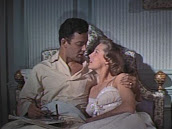A Woman's World (1954) may seem sexist on the surface. After all, no women are competing for the general manager's position at the Gifford car company. The women are invited to New York City ostensibly to help their husbands compete: which wife is the most supportive? Additionally, as Lauren Bacall's character sharply points out to Mrs. Talbot, a woman's world in the script is defined by her family. She'll support her husband for the sake of the children because the husband is working for them, not her.
However, in truth, the movie is intensely pro-women.
For one, the three women are quite individual as are their husbands and their marriages. Katie Baxter and her husband, Bill, are from Kansas. They are wholesome, family-oriented people. (Katie spends money on a barbecue at one point rather than a dress.) He works hard and has definite ideas, being honest and not afraid to speak up. He also believes, to his core, that if a man can't give dues to both his work and his family--if he has to sacrifice one for the other--then "something is wrong somewhere." When Clifton Webb's character, Gifford, needles him by saying, "Or it is the wife's fault," he doesn't agree.
He and his wife are true partners. They have similar goals and values and are grateful, in the end, that Bill doesn't get the job though one is left with the impression that Jerry Talbot, played by Van Heflin, trusts Bill and his opinions and may end up relying on the man in the future.
 Elizabeth Burns, played by Lauren Bacall, and Sidney Burns, played by Fred MacMurray, are the Horatio Alger couple. They married when they were quite young and poor and Sid had started out on the factory floor of the Gifford plant. He clawed his way up the ladder. He has hit the glass ceiling, and he honestly has nothing more to offer, though he doesn't appear to realize this fact. (All three men are strong leaders in their current positions.)
Elizabeth Burns, played by Lauren Bacall, and Sidney Burns, played by Fred MacMurray, are the Horatio Alger couple. They married when they were quite young and poor and Sid had started out on the factory floor of the Gifford plant. He clawed his way up the ladder. He has hit the glass ceiling, and he honestly has nothing more to offer, though he doesn't appear to realize this fact. (All three men are strong leaders in their current positions.) Unfortunately, the need to keep going, to never stop, is a kind of addiction for Sid. Horatio Alger with heart problems and an ulcer. His wife wants him to quit. If he gets the general manager job, it will kill him.
Interestingly, Lauren Bacall as Liz is the only wife of the three who truly qualifies as the kind of company wife that Gifford is supposedly looking for. She is svelte and well-dressed without vamping people. She is tactful. She is honestly kind. She is very intelligent. She remembers people's names, including men who have worked with her husband. She can easily carry a conversation. She is confident. Later, Gifford and his sister Evelyn (Margolo Gillmore) acknowledge that Liz would be the best fit for the type of company wife that Evelyn herself was. (Bacall gives Liz sophistication with a NYC rough edge--like Fred, she has moved up the ladder; unlike Fred, she doesn't covet the rungs above her.)
Liz sticks with her husband when she realizes that he can't help himself. Like Charles Dickens working hard all his life to avoid his father's stint in jail for debt, Sid can't stop himself pushing for the next position. They are both relieved when he doesn't get the post.
The third wife, Carol Talbot (Arlene Dahl), is the problem wife. On the surface, she appears to be what Gifford is looking for but actually she is quite the opposite. She is a woman who has convinced herself that every deal her husband got was because she slept with one of his superiors. The climax of the movie occurs when her husband, Jerry, informs her that a top position she thought she got for him was already signed, sealed, and delivered two weeks before the superior showed up in Texas to settle the final details. (The superior still took advantage of Carol's offer.)In fact, it is clear that she is entirely deceiving herself. She didn't sleep her husband's way to the top. Executives had their eye on Jerry for awhile. The wife wasn't a help. She was a hindrance. And she was a hindrance because, in fact, the job has nothing to do with a woman sacrificing herself on an altar to gain her husband--or herself--special treatment. She is neither wise enough nor canny enough to play that game in any case. Just as Lauren Bacall's Liz could wipe the floor with her, she would be entirely outmaneuvered by the sharkish CEOs of the industry.
Ultimately, the message is clear: these are women, individual women, not props to a husband's career or decorative pieces to be showcased. The one wife who treats herself like a prop is, in fact, the non-role-model.
Fantastic film, helped, of course, by great dialog and great acting!






No comments:
Post a Comment